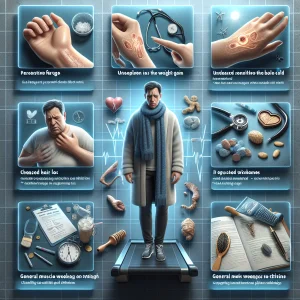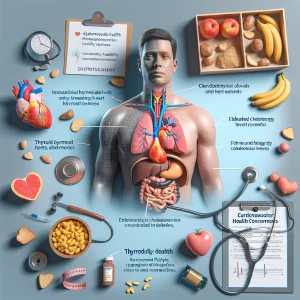Comprehensive Insights into the Health Risks of Hypothyroidism in Men
Hypothyroidism in men is a significant health issue that arises when the thyroid gland, located at the front of the neck, fails to produce adequate amounts of essential thyroid hormones. The primary hormones involved are thyroxine (T4) and triiodothyronine (T3), which play vital roles in regulating numerous bodily functions, including metabolism, energy levels, and overall health. While this condition can affect anyone, men often experience specific challenges. Recognizing and understanding these challenges is crucial for effective management and treatment, ensuring that men maintain their quality of life and overall wellness.
Understanding the nuances of hypothyroidism is essential for effective treatment and management. Many men may dismiss symptoms as mere fatigue or stress, attributing them to their busy lifestyles or aging. This misinterpretation can lead to prolonged discomfort and serious health complications. Early detection is critical; recognizing symptoms early can lead to timely interventions that significantly enhance health outcomes and improve overall well-being.
Various factors contribute to the onset of hypothyroidism, including autoimmune disorders like Hashimoto’s thyroiditis, certain medications, or complications from radiation therapy. Identifying these symptoms early is vital for initiating appropriate intervention strategies, which can ultimately lead to better health and improved quality of life.
Key Information Men Must Know About Hypothyroidism
- hypothyroidism results from insufficient production of thyroid hormones, leading to various physical and mental health challenges in men.
- Common physical symptoms may include persistent fatigue, weight gain, hair thinning, and muscle weakness, with increased risks for high cholesterol, heart disease, and diabetes.
- The psychological effects can manifest as depression, anxiety, and cognitive difficulties, which can severely impact a man’s quality of life.
- This condition also negatively impacts sexual health, potentially resulting in reduced libido, erectile dysfunction, and fertility issues.
- Weight management can become particularly challenging for men, as low thyroid hormone levels slow down metabolism, complicating efforts to achieve a healthy weight.
 Recognizing the Physical Symptoms and Health Risks of Hypothyroidism
Recognizing the Physical Symptoms and Health Risks of Hypothyroidism
The physical symptoms associated with hypothyroidism can vary widely among affected individuals. Men with this condition often report chronic fatigue, unexpected weight gain, increased sensitivity to cold, and muscle weakness. You may find yourself feeling unusually tired despite a full night’s sleep or struggling to maintain or lose weight, even when following a healthy diet and regular exercise regimen.
Such symptoms can lead to self-doubt regarding your health and lifestyle choices. Additionally, hypothyroidism can manifest in less apparent ways, such as dry or pale skin and increased hair loss. Addressing these symptoms early is crucial for effective management and restoration of health. Noticing and acknowledging these changes can facilitate timely medical consultations and interventions.
Moreover, hypothyroidism can lead to a slower heart rate, contributing to feelings of lethargy and reduced stamina during activities. The cumulative impact of these symptoms can significantly hinder daily life and functionality. Therefore, if you suspect that hypothyroidism may be affecting your health, seeking medical advice is imperative.
Exploring the Mental and Emotional Challenges Linked to Hypothyroidism
The mental and emotional consequences of hypothyroidism are often underestimated, yet they warrant significant attention. As levels of thyroid hormones decrease, you may experience mood swings, heightened feelings of depression, and increased anxiety. These emotional changes can lead to irritability and fatigue, which might strain personal relationships and diminish overall life satisfaction.
Studies have highlighted the intricate relationship between thyroid function and mental health, underscoring the importance of recognizing this connection for successful management. Cognitive decline is also a concern, with individuals often describing symptoms like “brain fog.” You might find it difficult to concentrate, forget routine tasks, or feel mentally sluggish, particularly in environments that require quick thinking and clarity.
Acknowledging these cognitive and emotional challenges is essential for advocating appropriate medical treatment. For more detailed information regarding the relationship between hypothyroidism and mental health, consider visiting the Mayo Clinic’s website, which provides valuable resources.
 The Profound Impact of Hypothyroidism on Men’s Sexual Health
The Profound Impact of Hypothyroidism on Men’s Sexual Health
Hypothyroidism can have a significant negative effect on sexual health in men, leading to various complications. Reduced thyroid hormone levels may result in decreased libido, erectile dysfunction, and potential infertility. You may notice a marked decrease in your interest in sexual activity or face challenges in achieving or maintaining an erection.
These sexual health issues can be distressing, inducing feelings of inadequacy, frustration, and anxiety in intimate relationships. The hormonal imbalances caused by hypothyroidism can also disrupt testosterone levels, complicating the already multifaceted nature of sexual health. Low testosterone often leads to increased fatigue, emotional instability, and lowered sexual desire, creating a challenging cycle that can be hard to break.
It is vital to engage in open discussions with your healthcare provider about these sexual health concerns. Exploring effective treatment options can help restore both thyroid function and sexual health, ensuring a holistic approach to overall well-being.
Strategies for Effectively Managing Weight with Hypothyroidism
Weight management is often particularly challenging for men diagnosed with hypothyroidism. The reduced metabolic rate that typically accompanies low thyroid hormone levels can significantly impede your ability to lose or maintain a healthy weight. Even with a consistent exercise routine and balanced diet, you may find it exceedingly difficult to shed unwanted pounds.
This ongoing struggle can lead to feelings of frustration and hopelessness concerning weight management. Understanding the relationship between hypothyroidism and weight gain is crucial for developing effective strategies. Working closely with a healthcare provider can help you create a personalized plan that addresses both thyroid health and weight management objectives.
This collaborative approach may involve adjusting medications, modifying dietary habits, and incorporating specific exercise routines designed to boost metabolism while considering your energy levels.
 Understanding the Link Between Hypothyroidism and Cardiovascular Health Risks
Understanding the Link Between Hypothyroidism and Cardiovascular Health Risks
The connection between hypothyroidism and cardiovascular health is a pressing concern for men diagnosed with this condition. Insufficient thyroid hormone levels can lead to elevated cholesterol levels, thereby increasing the risk of heart disease over time. It’s important to recognize that the fatigue and lethargy often experienced with hypothyroidism may not only be symptoms of the disorder but could also serve as indicators of underlying cardiovascular problems that require medical attention.
Regular cardiovascular assessments are vital for individuals with hypothyroidism. Your healthcare provider may recommend adopting lifestyle changes, including a heart-healthy diet rich in fruits, vegetables, whole grains, and lean proteins. Additionally, engaging in regular physical activity that matches your energy levels can help support thyroid function and improve cardiovascular health. By actively managing both thyroid function and cardiovascular fitness, you can significantly reduce the potential for further health complications.
Exploring the Effects of Hypothyroidism on Male Fertility
Fertility challenges represent a crucial aspect of hypothyroidism in men. Low levels of thyroid hormones can disrupt the delicate hormonal balance necessary for proper sperm production and overall reproductive health. If you are facing difficulties in conceiving, it’s essential to consider how your thyroid function may be impacting your fertility journey.
Effectively treating hypothyroidism can improve your overall health and increase the likelihood of successful conception. Collaborating with a knowledgeable healthcare provider who understands the complex relationship between thyroid function and fertility is essential for developing a comprehensive strategy that addresses both issues. This may include routine monitoring of hormone levels through blood tests and adjusting medications to optimize reproductive health.
Holistic Approaches to Managing and Treating Hypothyroidism in Men
Successfully managing hypothyroidism requires a holistic approach that includes regular monitoring through blood tests, medication management, lifestyle modifications, and open communication with healthcare professionals. Blood tests are crucial for diagnosing hypothyroidism, measuring key indicators such as Thyroid-Stimulating Hormone (TSH) and T4 levels. Elevated TSH levels often suggest an underactive thyroid, while low T4 levels confirm the diagnosis.
Upon diagnosis, treatment typically involves hormone replacement therapy with synthetic thyroid hormones like levothyroxine. This medication helps restore normal hormone levels and alleviates many symptoms associated with hypothyroidism. Regular follow-up appointments are essential for evaluating treatment effectiveness and making necessary adjustments based on blood test results.
In addition to medication, lifestyle modifications—such as adopting a nutrient-rich diet supportive of thyroid health, including adequate iodine, selenium, and zinc—can be beneficial. Engaging in consistent exercise that aligns with your energy levels can also manage symptoms while enhancing overall wellness. By actively participating in your health management through education, collaboration with healthcare providers, and lifestyle changes, you can lead a fulfilling life despite the challenges posed by hypothyroidism.
Frequently Asked Questions About Hypothyroidism in Men
What is hypothyroidism in men?
Hypothyroidism in men refers to a condition where the thyroid gland does not produce sufficient thyroid hormones, leading to a slowdown in metabolism and a variety of health issues.
What are the common symptoms of hypothyroidism in men?
Typical symptoms of hypothyroidism in men include fatigue, weight gain, cold sensitivity, dry skin, constipation, muscle weakness, and symptoms of depression.
How is hypothyroidism diagnosed in men?
Diagnosis of hypothyroidism in men is made through blood tests that measure levels of thyroid-stimulating hormone (TSH) and thyroxine (T4) in the blood.
What causes hypothyroidism in men?
The primary cause of hypothyroidism in men is often Hashimoto’s thyroiditis, an autoimmune disorder. Other contributing factors can include thyroid surgery, radiation treatment, and certain medications.
What treatment options are available for men with hypothyroidism?
Men diagnosed with hypothyroidism typically receive treatment through synthetic thyroid hormone medications, such as levothyroxine, to replace deficient hormones and restore normal thyroid function.
Can hypothyroidism lead to other health complications in men?
If left untreated, hypothyroidism in men can lead to complications such as heart disease, fertility issues, and mental health challenges. Seeking timely treatment is essential to mitigate these risks.
This Content Is Sponsored By: Thyroid Testing UK
Hypothyroidism in Men: The Impact On Health Was First Published By https://bloodtest.co.uk
Find Us On Facebook: EZ Blood Tests
The Article: Hypothyroidism in Men: Health Implications Explored appeared first on: https://ezbloodtest.com
The Article Hypothyroidism in Men: Exploring Health Implications Was Found On https://limitsofstrategy.com



